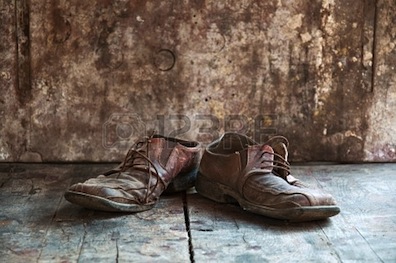Early in Proteus Stephen thinks, "My two feet in
his boots are at the ends of his legs." Near the end of the
episode he looks down at the "buck's castoffs" clothing his
legs and thinks of "hismy sandal shoon" on his feet. The lower
part of his body is clad in Mulligan's hand-me-down pants and
shoes, so, in his mind, his legs become Mulligan's legs. This
chapter rarely narrates any of Stephen's physical actions—it
is all thoughts, fantasies, memories, fears, hopes—and when it
does, it often seems that some barely recognized part of his
body is doing them, not Stephen himself. This detachment
implies radical self-alienation, but Proteus also
shows Stephen arcing toward trust in his body, and trust in
its connection to other people.
Amid the torrential welter of Stephen's thoughts, the
physical reality of his own body makes only brief appearances.
The narrative affords frequent but fleeting glimpses of the
legs and feet that are carrying him along the sand: "Stephen
closed his eyes to hear his boots crush crackling wrack and
shells"; "His boots trod again a damp crackling mast,
razorshells, squeaking pebbles, that on the unnumbered pebbles
beats, wood sieved by the shipworm, lost Armada. Unwholesome
sandflats waited to suck his treading soles"; "His feet
marched in sudden proud rhythm over the sand furrows, along by
the boulders of the south wall"; "He had come nearer the edge
of the sea and wet sand slapped his boots.... Here, I am not
walking out to the Kish lightship, am I? He stood suddenly,
his feet beginning to sink slowly in the quaking soil. Turn
back"; "He lifted his feet up from the suck and turned back by
the mole of boulders."
In some of these peripatetic sentences Stephen is seen
exerting a kind of agency—"He coasted them," "He turned
northeast," "Proudly walking," "He stood suddenly," "He lifted
his feet"—but in many others his boots and feets take over as
grammatical subjects. The same back-and-forth between self and
body happens with other corporeal parts. As he tries out words
of a poem, his lips and mouth seem to be doing the thinking:
"His lips lipped and mouthed fleshless lips of air: mouth to
her womb. Oomb, allwombing tomb. His mouth moulded issuing
breath, unspeeched." But then, "Turning his back to the sun,"
Stephen leans against a rock and writes. When he urinates, the
"job"
he is performing gets lost in the sounds coming back to him
from the tidepool: "Better get this job over quick. Listen: a
fourworded wavespeech... And, spent, its speech ceases. It
flows purling, widely flowing, floating foampool, flower
unfurling." At the end of the chapter, he disposes of another
product of his body—"He laid the dry snot picked from his
nostril on a ledge of rock, carefully"—but the action of
nose-picking itself is not mentioned. To a reader, it seems to
have been performed unconsciously.
When he imagines his uncle Richie reclining "Cleanchested" in
bed, Stephen thinks, "He has washed the upper moiety." The
sense of abstract detachment from the body conveyed by this
strange word feels of a piece with his arm's-length dealings
with his own physicality. It is as if "he" and his feet, his
legs, his nose, his lips, and his penis have been introduced
but are not quite on speaking terms. But Stephen is not locked
in the kind of fiercely resolute asceticism that afflicts Mr.
Duffy in "A Painful Case." Proteus shows him, if not
quite able to actively pursue sexual happiness, yet
nonetheless aware of the physical connection he lacks and
eager to end his hermetic isolation: "Touch me. Soft eyes.
Soft soft soft hand. I am lonely here. O, touch me soon, now.
What is that word known to all men? I am quiet here alone. Sad
too. Touch, touch me."
Two other moments in the chapter provide glimpses of this
kind of trust in the body's impulses, trust in physical
connectedness. Early in his walk, Stephen's legs tell him that
he is nearing the point where he could turn and go to
Irishtown: "His pace slackened. Here. Am I going to aunt
Sara's or not?" A page and a half later he realizes that
his legs have decided for him: "He halted. I have
passed the way to aunt Sara's. Am I not going there? Seems
not." His mind has certainly been involved in the
decision, since much of the intervening time has been occupied
with thoughts of the deplorable conditions in that home. But
the prose presents the route as something that has been chosen
for Stephen, something in which he merely acquiesces.
Later in Proteus he notices that he has acquired part
of his gestural vocabulary from another person just as clearly
as he has borrowed Mulligan's pants and shoes: "He lay back at
full stretch over the sharp rocks, cramming the scribbled note
and pencil into a pocket, his hat tilted down on his eyes. That
is Kevin Egan's movement I made, nodding for his nap,
sabbath sleep." Stephen never expresses any deep
affection for Egan, but he has spent a good deal of time with
him in Paris and seems to feel some affinity with him as a
forlorn fellow exile. In recognizing that he has taken some
small part of Egan into himself, he views his body as a site
of connection, a shared property. In this sentence, and in the
recollection
of Egan's greeting that follows, his many thoughts about
the "wild goose" earlier in the chapter terminate in a feeling
of human warmth.
